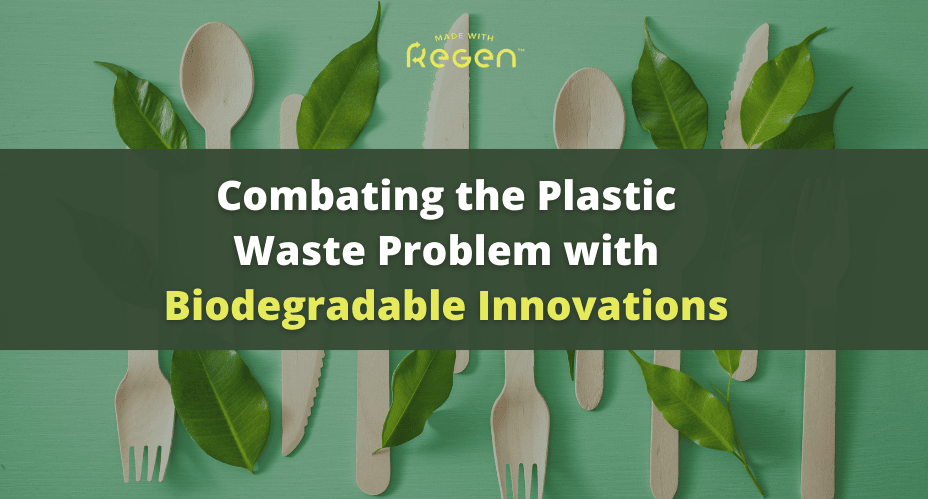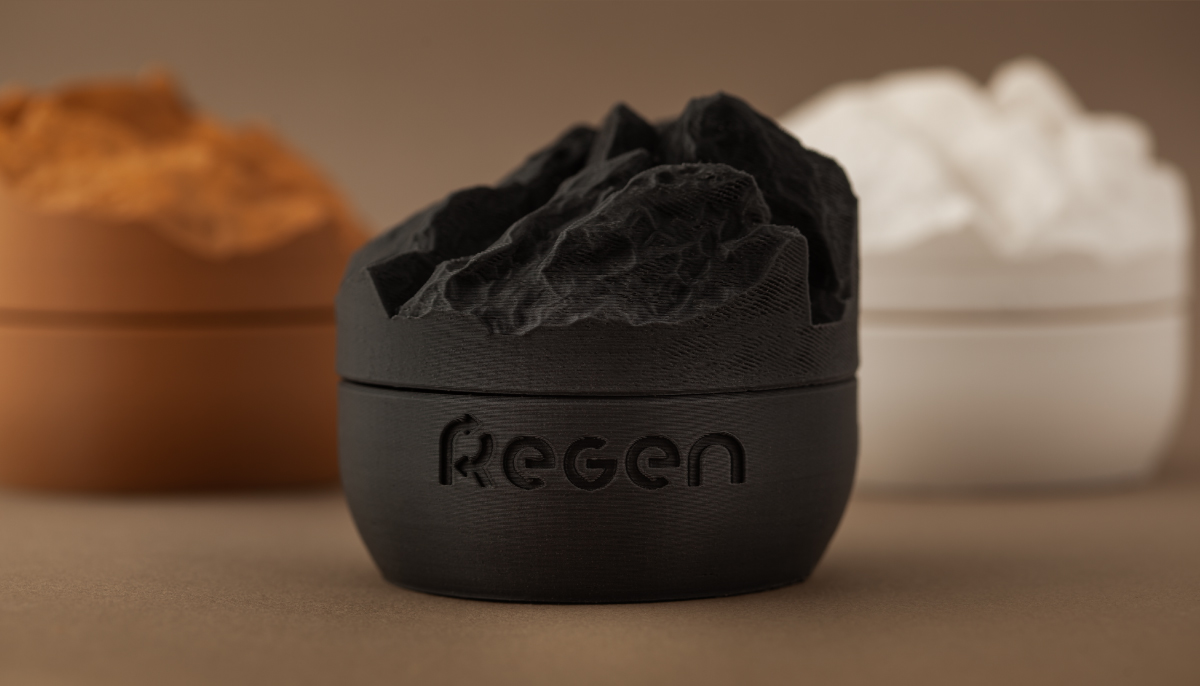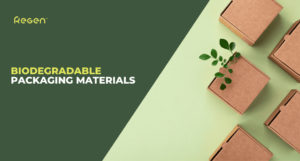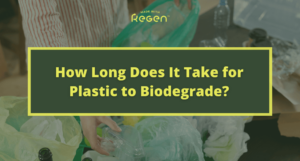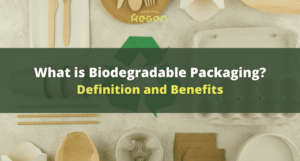Plastic pollution is a growing crisis, with millions of tons of waste harming ecosystems, clogging waterways, and driving greenhouse gas emissions yearly. Unlike traditional plastics, whose toxic residues remain in the environment, REGEN™ bioplastics tackle this challenge with innovative, eco-friendly solutions.
Their biodegradable, compostable materials provide a high-performance alternative to petroleum-based plastics, breaking down within 90 days in controlled environments and meeting strict compostability standards. REGEN™ products, made from renewable resources, also have a much smaller carbon footprint, helping reduce waste and drive the shift toward a circular economy.
Environmental Impact of Plastic Waste
Plastic waste poses a significant threat to ecosystems, with around 12 million metric tons accumulating in the oceans yearly. Among this, ghost fishing gear, about 640,000 tons, traps marine animals like mammals and fish, often causing them to drown or starve.
Additionally, plastics recycle insufficiently and break down into microplastics that infiltrate and persist in terrestrial ecosystems, harming soil health and plant growth. The long-term consequences are severe, with the plastics industry projected to contribute up to 15% of global carbon emissions by 2050 (EPA), threatening biodiversity and aggravating climate change.
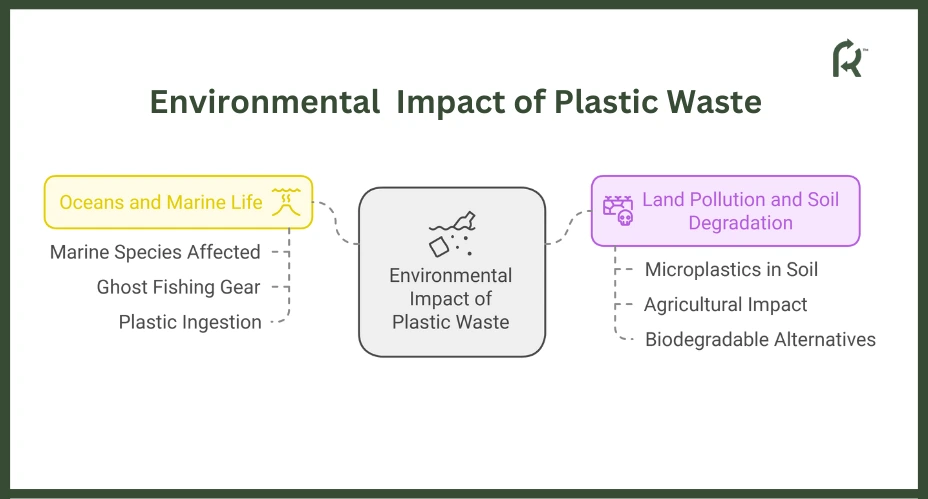
1. Oceans and Marine Life
Plastic pollution in the oceans severely threatens marine life, equivalent to a garbage truck’s worth entering the seas every minute. This overflow impacts at least 800 marine species, including all seven sea turtle species, with research indicating that 52% of sea turtles have ingested plastic, which can lead to starvation as they mistake plastic for food.
Seabirds are also heavily affected; up to 1 million die annually from eating plastic. A report by WWF notes that nearly 88% of marine species studied have been negatively impacted by plastic pollution, emphasizing the urgent need for solutions like bioplastics to mitigate this crisis and protect aquatic ecosystems.
2. Land Pollution and Soil Degradation
Plastic debris in soils significantly threatens soil fertility and health, leading to agricultural productivity degradation. A United Nations report indicates that agricultural soils may contain more microplastics than oceans, with 12.5 million tons of plastic in agriculture in 2019.
For example, studies have found that even low levels of macroplastic can impair soil carbon storage and phosphate availability. Biodegradable bioplastics, such as those produced by REGEN™, are certified to meet ASTM D5338 standards and achieve a carbon footprint reduction of up to 70% compared to conventional plastics.
Causes and Effects of Plastic Pollution
Plastic pollution stems from the massive production and disposal of petroleum-based plastics fueled by industries and consumer habits favoring single-use convenience.
With over 300 million tons of plastic produced yearly and less than 10% recycled, the result is widespread environmental damage, from harming wildlife to contaminating soil and filling oceans with microplastics.
Solutions like REGEN™’s compostable plastics are essential, offering an alternative that reduces fossil fuel reliance and helps protect ecosystems and human health.
How to Effectively Resolve Plastic Waste
Strategies like adopting sustainable materials and advancing circular economy principles are essential for tackling plastic pollution effectively. Companies and consumers should shift to producing and buying reusable products and biodegradable alternatives to reduce single-use plastics that pollute the environment.
Improper disposal, dumping, and littering disrupt wildlife and cause plastics to entangle animals, leaving lasting damage. Furthermore, governments can support these efforts by implementing policies that penalize plastic waste. By implementing these actions, we can minimize the harmful impact of plastic, reduce waste, and protect the environment for future generations.
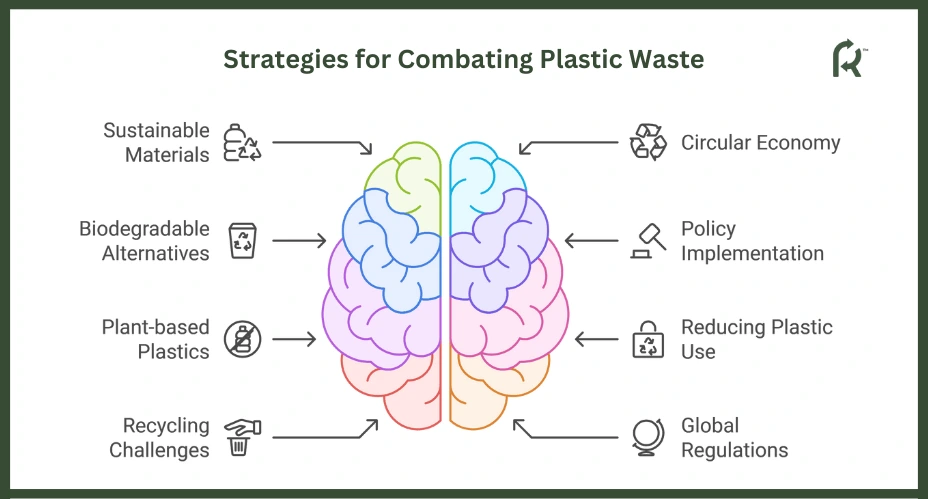
Think About Sustainable Alternatives
Sustainable alternatives to traditional plastics are essential for addressing the growing environmental crisis. Plant-based bioplastics, such as polylactic acid (PLA) and polyhydroxyalkanoates (PHA), provide viable replacements that minimize environmental harm.
Among these, REGEN™’s PHA materials stand out as a superior alternative to petroleum-based plastics. They are compostable under industrial conditions and exhibit enhanced durability and flexibility, making them ideal for biodegradable packaging.
Minimize Plastic Usage
Cutting back on plastic use is essential to reducing waste and conserving resources. Simple changes, like using reusable products, avoiding single-use plastics, and supporting eco-conscious brands, can make a big difference.
At the same time, industries need to rethink their approach by creating packaging and products that use less material and are easier to recycle. Businesses can achieve these goals by choosing sustainable solutions like REGEN™’s compostable plastics while meeting the rising demand for greener options.
Recycling Traditional Plastics
Recycling traditional plastics can help mitigate plastic waste, but it is not a sustainable long-term solution. Challenges such as contamination, limited recyclability of certain plastics, and energy-intensive processes mean that recycling often delays rather than prevents pollution, with much of the waste eventually ending up in landfills or incinerators.
Unlike recycling, which relies on a flawed system, REGEN™ compostable plastics reduce environmental harm by breaking down safely and enriching the soil.
Laws and Regulations
Globally, many rules and regulations are being developed to address the issue of plastic waste, primarily through prohibitions on single-use plastics.
For example, the European Union has set strict goals to decrease plastic consumption and advance circular economy principles, while other nations have banned plastic bags and straws. Businesses can improve their sustainability profiles and comply with environmental standards by using REGEN™.
Innovative Solutions That Reduce Plastic Waste
New materials and technologies are examples of innovative solutions that are essential to reducing the problem of plastic waste. REGEN™’s biodegradable PHA (polyhydroxyalkanoates), a plant-based plastic that completely biodegrades in industrial composting settings, is one encouraging example.
In contrast to conventional plastics, these environmentally friendly materials lessen dependency on fossil fuels and keep plastic from building up in landfills and the ocean. Adopting sustainable alternatives can drastically reduce plastic waste, encourage a circular economy, and clear the path for a more ecologically conscious future.
Plant-Based Bioplastics
Plant-based plastics, such as those offered by REGEN™, provide significant advantages over traditional petroleum-based plastic. Made from renewable resources like by-products from the pulp and paper industry, they are fully biodegradable under 6 months under controlled settings, breaking down into harmless substances without toxic residues.
In addition, compared to traditional plastics, one tonne of REGEN™ bioplastic can reduce greenhouse gas emissions by up to three tonnes. Businesses may drastically lessen their environmental impact by implementing plant-based polymers like REGEN™.
Community and Industrial Engagement
Tackling plastic waste requires collaboration between communities, businesses, and industries. Initiatives like the Alliance to End Plastic Waste show how working together can drive change by developing better waste management solutions.
These partnerships promote innovation, improve recycling, and support the circular economy. Community involvement is critical, too; local clean-up efforts encourage long-term environmental care. By joining forces, we can create policies and practices that reduce plastic waste and boost sustainability.
The Future of Plastic Waste Management
The future of plastic waste management will focus on increasing recycling rates and developing truly circular alternatives like biodegradable materials, such as Polyhydroxyalkanoates (PHA).
Innovations in biodegradable materials are essential to ensure a sustainable lifecycle and reduce plastic waste. Leading the way in this change is REGEN™, which assists brands in minimizing their environmental effect and influencing the direction of plastic waste management by providing compostable and biodegradable substitutes.
Key Takeaways
- Better recycling practices and cyclical, biodegradable polymers like PHA are becoming the new solutions to the plastic waste problem.
- Compostable packaging choices are crucial to minimizing long-term environmental harm as demand for sustainable packaging increases.
- Leading the way in this shift is REGEN™, which provides cutting-edge biodegradable packaging to assist brands in meeting their sustainability goals. Their products pave the way for a more sustainable, waste-free future by promoting eco-friendly, circular materials.
Frequently Asked Questions
Can Biodegradable Plastics Solve the Plastic Waste Problem?
Biodegradable plastics, like PHA, offer a promising solution to the plastic waste problem by breaking down faster than traditional plastics. However, their effectiveness depends on specific conditions, and not all biodegradable plastics fully decompose or break down harmlessly.
REGEN™’s PHA bioplastics offer a reliable, compostable alternative that decomposes in both natural and industrial environments, helping reduce plastic waste, support a circular economy, and meet consumer demand for eco-friendly packaging solutions.
Why Does Not All Plastic Waste Get Recycled?
Not all plastic waste gets recycled due to several challenges, including their chemical composition or contamination from food, that hinder the recycling process. The lack of proper infrastructure and inconsistent recycling systems worldwide makes collecting and processing plastic waste efficiently difficult.
REGEN™’s compostable plastics provide an alternative to traditional recycling by offering packaging that breaks down naturally, helping brands promote sustainability and easing pressure on overburdened recycling systems.
How Much Plastic Waste is Generated Each Year?
The global plastic waste crisis is escalating, with projections indicating that 220 million tonnes of plastic waste will be generated in 2024, a 7.11% increase since 2021. Alarmingly, nearly 70 million tons of this waste is expected to enter nature due to inadequate waste management systems.
Currently, only 9% of plastic waste is recycled globally, with the rest either incinerated or sent to landfills, contributing to environmental pollution. Furthermore, plastic production is projected to triple by 2060, highlighting the urgent need for immediate action to mitigate plastic waste and its harmful effects on ecosystems and human health.
